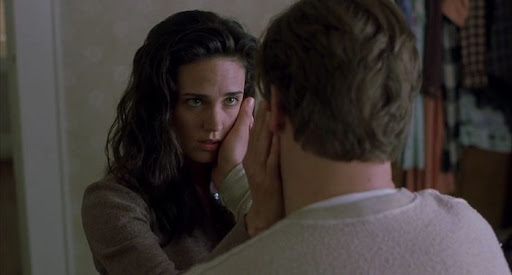
To listen to today’s reflection as a podcast, click here
In the movie A Beautiful Mind, Russell Crowe plays Nobel Prize-winning mathematician John Nash.
The film recounts the true story of Nash’s descent into schizophrenia, followed by his agonizing attempts to regain something of a “normal” life as a Princeton University professor in the middle of the twentieth century.
But the story behind that story is just as notable.
It is the story of Alicia Nash’s resilient love for her husband.
Nash was not exactly an easy guy to date.
Early in the film, sensing that he’s being drawn toward this young woman, he says: “Alicia, does our relationship warrant long-term commitment? I need some kind of proof, some kind of verifiable, empirical data.”
Alicia, played by Jennifer Connelly (in a role that won her the Academy Award for Best Supporting Actress), replies: “I’m sorry, just give me a moment to redefine my girlish notions of romance.”
It’s challenging enough to marry the ultimate math nerd (although it’s worth noting she herself was a gifted physicist). But when Nash begins to drift across the boundary between fantasy and reality, it seems impossible for their relationship to endure.
As he plunges into lostness and despair, Alicia says gently, “You want to know what’s real?”
She puts her hand on his heart and his hand on her face. “This is real…”
How does she cope as he vanishes into a schizophrenic fog?
“I look at him and I force myself to see the man that I married, and he becomes that man. He’s transformed into someone that I love. And I am transformed into someone that loves him.”
Americans by and large subscribe to the myth that real love is a wonderful feeling that carries us along, sometimes even against our will, instead of a miraculous choice that must be made, again and again, in order to keep our relationships alive and well.
Feelings follow choices. Like Alicia, we can look at each other with “grace-eyes”—much as we look with transforming kindness upon a loved one whose personality has become clouded by dementia, yet who is still there.
It’s impossible to read the apostle Paul’s letters, now twenty centuries old, and not be struck by his call to relational intentionality.
“Since you have been chosen by God who has given you this new kind of life, and because of his deep love and concern for you, you should practice tenderhearted mercy and kindness to others. Don’t worry about making a good impression on them, but be ready to suffer quietly and patiently. Be gentle and ready to forgive; never hold grudges. Remember, the Lord forgave you, so you must forgive others” (Colossians 3:12-14, “The Living Bible”).
Then he adds, “And over all these virtues put on love, which binds them all together in perfect unity” (Colossians 2:15).
Paul seems to be thinking of a girdle, or belt, which was a standard piece of first century clothing. After pulling on one’s tunic and cloak, the girdle “held it all together,” making it possible to walk and to work.
Love – choosing to act, regardless of feelings, in ways that will bless another person – is what allows every marriage, every friendship, and every partnership to keep going forward.
A Beautiful Mind closes with Nash accepting his Nobel Prize in Stockholm 30 years ago. Director Ron Howard chose to include Nash “seeing” the three imaginary figures that have long been part of his psychosis. But now he is able to ignore them. The end-notes of the 2001 film are now quite dated, since both John and Alicia died in 2015.
But the depiction of his speech remains a remarkable scene.
The brilliant mathematician, having found his way back to sanity, looks out over the audience:
“I’ve always believed in numbers, in equations, in logic and reason. But after a lifetime of such pursuits I ask: What truly is logic? Who decides reason? My quest has taken me to the physical, the metaphysical, the delusional, and back. I have made the most important discovery of my career – the most important discovery of my life. It is only in the mysterious equations of love that any logic or reasons can be found.”
Then he looks at Alicia, sitting in the crowd:
“I am only here tonight because of you. You are the only reason I am. You are all my reasons. Thank you.”
Most of us will never be celebrated as someone with a beautiful mind.
But we can all know something even more profound.
We can all experience the wonder of a beautiful heart.
